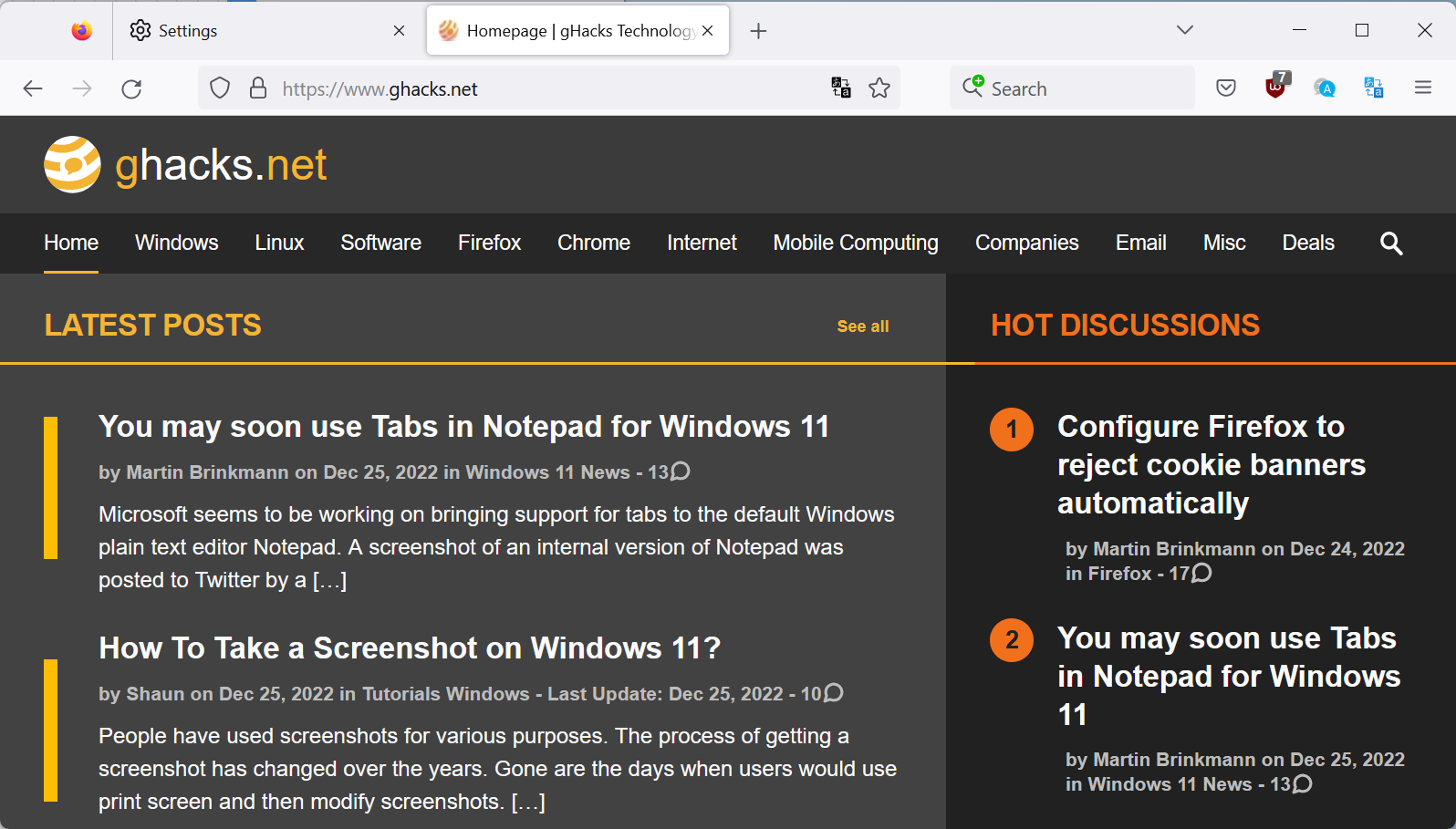Firefox's Accessibility Performance is getting a huge boost

Firefox users who use Accessibility tools in the web browser will soon notice huge performance improvements. Accessibility tools, like screen readers, help users access content provided by the web browser and the displayed websites and applications.

These tools need to interact with the browser and react to changes made by the user or the site in question. When a user navigates away from a page, new content is loaded, which the Accessibility tool needs to access.
If there is too much delay, because of slow operations or other issues, then it may become a drag to use Firefox for accessing content on the Web.
Firefox users on Windows and Linux will benefit from the improvements when versions 111 and 112 are released. The changes are being tested in Firefox Nightly already and Mozilla plans to roll them out in Firefox Beta in January when Firefox Beta 110 is released.
Mozilla ran benchmarks to test the new architecture against the classic architecture that Firefox uses currently.
Opening a Gmail message from the inbox, for instance, takes 100ms now compared to 200ms before. Similarly, closing a Gmail message and returning to the inbox takes 150ms under the new architecture, opposed to 410ms under the old.
The gains when loading large documents, tables and other content are even more impressive. A test on a large document, the very large HTML Standard Spec, improved the performance from 175 seconds to just 15 seconds. Another test, this one one a page with a tablet with over 12000 rows, saw loading performance improve from 128 seconds to 6 seconds.
Mozilla admits that Firefox's new architecture for Assistive Technologies is similar to the Chrome implementation, but that it is different in three key aspects.
The explanation is somewhat technical, but the key takeaways are that Firefox's implementation saves memory, reduces complexity, and that hit testing is more accurate. Hit testing is a special use case in which the Assistive Technology requests data on a specific x, y location on the screen.
Mozilla published details on the implementation here. It provides a historical background on the implementation, starting with pre-multi-process Firefox and the years that followed. It is an interesting read.
Firefox users may start testing the new Assistive architecture in Firefox Nightly for Windows and Linux right away. The stable rollout for these two operating systems will happen in February and March, with the releases of Firefox 111 and 112. The Mac version is still in development, but should be released in the first half of 2023 as well.
Now You: do you use Assistive Technologies?






















Article: “[…] do you use Assistive Techologies? …” Martin, you probably meant to write: “Tech[n]ologies.” Yes, I make use of assistive technology when surfing the web.
Humans aren’t meant to read that – large – HTML5 Specification, it’s for Software Engineers making the actual Browsers and that’s why the language they use is so wonked. Nonetheless, the performance increase reported was impressive.
It looks like you were planning on creating a hyperlink to the (jantrid.net/2022/12/22/Cache-the-World/ ‘nsCSSFrameConstructor.cpp on Searchfox’ results)? Around the words: “[…] Another test, this one one …” there is also a ‘non-breaking space’ after the second repeated word, i.e. “one”, the flow is affected.
Also try to avoid using the link text such as “here” (second to last paragraph) whenever possible. Using “click here” is not considered descriptive, and is ineffective for a screen reader user.
The Firefox accessibility engine improvements look promising.
Side-note : even ‘Assistive Techonlogies’ would have been understood :
The pweor of the hmuan mind : [https://img.justpaste.me/i/20221227/pABT3/Various-231.jpg]
Bakc to wrok :=)
Keep guessing – you’re getting warmer, Tom. I was officially diagnosed, with a fairly common cognitive disability when I was studying at University by an Educational Psychologist. One of the noticeable effects of my disability is I have a poor or faulty short-term memory and have trouble with sequencing. It primarily affects my reading and writing skills. I did co-author a book; my chapter covered the complex topic of the TCP/IP protocol stack. :-)
Martin, let me begin to convey to you as yet a slightly belated Christmas wish.
Hope you and all those you love have a Merry Christmas.
Then back to the turbocharging accessibility, performance, and maintenance, improvement of possibly Firefox 112.
This is really good news and hopefully, this will make Mozilla Firefox’s user numbers even
remarkably larger.
Yes, screen readers, and this is great news. The Chrome/Chromium approach was ultimately the correct one, obviously. I just hope they aren’t too long in bringing this to macOS, as we really need some competition over there. Or maybe I should just accept the inevitable, and switch back to Winbloze, myself.
Why not Linux instead of “Winbloze”? The linked blog post says that 110 beta will have this enabled for both Windows and Linux.
Linux is great for running my router and server. GUI desktops, not so great, at least not with Orca screen reader. I’d never say never, and ironically Firefox was one of the biggest problem children so maybe it will get noticeably better, but for now it seems to be perpetually “not quite there” and people just resort to Gnome Terminal to fill the gaps. Use a Mac, get more accessible GUI apps and system-wide in-box support, and the personal commitment one expects from a giant corporation intent on using Accessibility for PR purposes. Use Windows, get the best accessibility support there is, and no privacy. It’s a hard life …